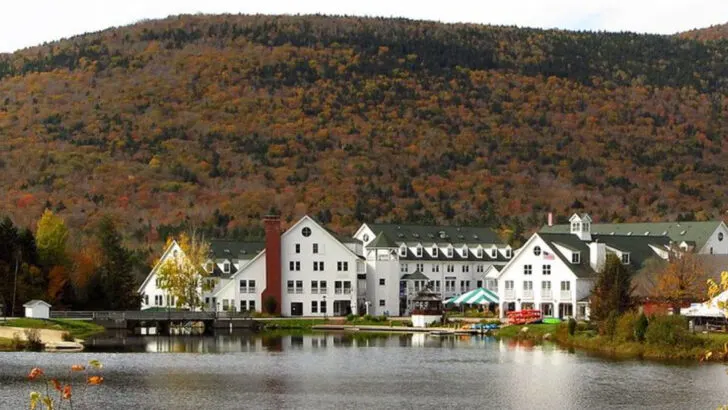New Hampshire’s mountain towns have long been cherished for their close-knit communities and stunning landscapes.
However, rapid development and an influx of seasonal residents have reshaped these areas, leaving some locals feeling like strangers in their own homes.
Here’s a look at 11 towns where the sense of community has changed.
Lincoln
Lincoln, once a humble mill town, now bustles as a resort hub. With luxury condos and vacation homes on the rise, locals feel outnumbered by transient visitors.
The town’s charm has shifted from community gatherings to commercialized attractions. Residents reminisce about when neighbors were familiar faces, not fleeting guests.
As the town caters more to tourists, the bonds that held the community together are loosening, leaving many to long for the Lincoln of yesteryears.
Conway
Conway’s transformation into a bustling retail hub has left locals feeling disconnected. Once an outdoorsy escape, it now caters primarily to visitors.
Housing shortages make it tough for long-time residents to stay, and familiar faces are harder to find.
Many yearn for the days when Conway was a place where everyone knew each other, and community spirit thrived beyond its commercial facade.
Bartlett
Bartlett’s charm once lay in its quiet ski-town serenity. Yet, second-home buyers have transformed it into a revolving door of visitors.
Year-round residents are dwindling, and the town’s essence has shifted. Locals miss the days when their community felt personal and steady.
Now, amidst investment properties, the town’s once-close community ties seem like a distant memory, lost to the allure of short-term rentals.
Jackson
Jackson’s postcard beauty remains, but its soul feels altered. Skyrocketing home prices have ushered in upscale vacation rentals, replacing cozy inns.
Locals lament the loss of neighborly warmth and a sense of belonging. Despite its stunning landscape, the town feels less like home.
The influx of wealth has left many feeling like strangers in their own picturesque, yet unfamiliar, hometown.
Franconia
Franconia, near vibrant Cannon Mountain, once thrived on community events like the town fair. Now, seasonal residents outnumber locals.
The sense of shared roots that defined the town has diminished. Regular gatherings feel different, with fewer familiar faces.
As more families leave, the town’s tightly-knit fabric unravels, leaving locals yearning for the days when community spirit was strong.
Sugar Hill
Sugar Hill, famed for its lupine fields and vistas, attracts out-of-state vacation homeowners. This influx creates a transient population.
The town’s rhythm feels disrupted, bustling in summer and eerily quiet in winter. Community bonds have weakened.
Locals miss the neighborly connections that once flourished amid the breathtaking scenery, now overshadowed by seasonal tourism and development.
Gorham
Gorham retains its grit, but rising property costs push out generational families. The loss of workforce housing compounds the issue.
Maintaining the small-town closeness is increasingly challenging. The familiar, heartwarming exchanges grow rarer.
Locals hold onto the hope of preserving the town’s spirit, even as economic pressures drive change, making their community feel less personal.
Bethlehem
Bethlehem’s creative revival with galleries and trendy spots excites many, yet long-time residents feel nostalgic.
The cost of living increases, challenging affordability and familiarity. The once-tight community now feels dispersed.
While the artistic transformation is vibrant, locals long for the cohesive neighborly atmosphere that defined the town before its cultural shift.
Wolfeboro
Perched between the Lakes Region and mountains, Wolfeboro is a seasonal haven for second-home owners. Winter leaves streets empty.
The town’s year-round essence fades, replaced by sporadic vibrancy. Locals miss the continuous community engagement.
As seasonal visitors come and go, the town’s heart—once beating with year-round warmth—feels quieter, yearning for a return to its lively past.
Littleton
Littleton’s Main Street thrives with boutiques and tourist influx, yet locals feel the town’s original spirit waning.
Its working-class roots are overshadowed by economic growth, altering community dynamics. Familiar exchanges are less frequent.
While business booms, the soul of Littleton—a place where everyone knew each other—seems to drift farther away with each passing season.
Waterville Valley
Waterville Valley, known for a resort lifestyle, sees balance shifting from locals to visitors. Crowds bring economic vitality.
Yet, high housing costs challenge working families, reducing familiar faces. The community’s essence feels increasingly seasonal.
The town’s identity, once a harmonious blend of residents and tourists, now leans towards a temporary buzz, missing its enduring ties.

